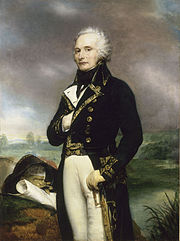Alexandre de Beauharnais
|
General Alexandre Viscount of Beauharnais |
|
|---|---|

General Alexandre de Beauharnais, by Georges Rouget (1834)
|
|
| Birth name | Alexandre François Marie |
| Born |
28 May 1760 Fort-Royal, Martinique, France |
| Died | 23 July 1794 (aged 34) Paris, France |
| Buried at | Picpus Cemetery, Paris, France |
| Allegiance |
|
| Service/branch | Infantry |
| Years of service | 1776 – 1793 |
| Rank | Divisional general |
| Unit |
|
| Commands held | Army of the Rhine |
| Battles/wars |
French Revolutionary Wars (1792–1802) |
| Spouse(s) | Joséphine de Beauharnais (m. 1779–94); his death |
| Relations |
Eugène de Beauharnais (son) Hortense de Beauharnais (daughter) |
| Other work |
|
French Revolutionary Wars (1792–1802)
Alexandre François Marie, Viscount of Beauharnais (28 May 1760 – 23 July 1794) was a French political figure and general during the French Revolution. He was the first husband of Joséphine Tascher de la Pagerie, who later married Napoleon Bonaparte and became Empress of the First Empire.
Alexandre was arrested in March 1794, and following his sentence of death during the Reign of Terror, was executed by guillotine in Paris's Place de la Révolution.
His paternal grandparents Claude de Beauharnais (1680–1738) and Renée Hardouineau (1696–1744) were married in La Rochelle during 1713. His father François de Beauharnais, Marquess de la La Ferté-Beauharnais (1714–1800) served as Governor of Martinique. Alexandre was the third of three sons born to him by his first wife Marie Henriette Pyvart de Chastullé (1722–1767) - the first died in infancy, and the second was Francis VI of Beauharnais. His father was remarried in 1796 to Eugenie de Tascher de la Pagerie (1739–1803).
Alexandre was born in Fort-Royal (today's Fort-de-France), Martinique. On 13 December 1779 in Paris, he married Joséphine Tascher de la Pagerie, the future Empress of France. They had two children:
Alexandre fought in Louis XVI's army in the American Revolutionary War. He was later deputy of the noblesse in the Estates-General, and was president of the National Constituent Assembly from 19 June to 3 July 1791 and from 31 July to 14 August 1791. Made a general in 1792 (during the French Revolutionary Wars), he refused, in June 1793, to become Minister of War. He was named General-in-Chief of the Army of the Rhine in 1793.
...
Wikipedia
